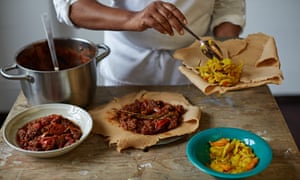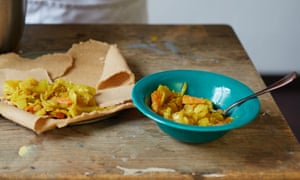I
t’s the colours that you first notice about Ethiopian food. The dishes look like  children’s paint sets: purple beetroot, orange carrots, green cabbage and the unmistakable, rich red of berbere spice mix. A musky, intense mixture of dried spices and chilli, berbere lends its fire to many traditional Ethiopian wat, which tends to be translated as “stew.” The majority of wat are not stews in the sense that we are familiar with, but more like curries: long-simmered dhals, and vegetables cooked together very slowly, so that they meld into a sweet alloy of textures and flavours.
children’s paint sets: purple beetroot, orange carrots, green cabbage and the unmistakable, rich red of berbere spice mix. A musky, intense mixture of dried spices and chilli, berbere lends its fire to many traditional Ethiopian wat, which tends to be translated as “stew.” The majority of wat are not stews in the sense that we are familiar with, but more like curries: long-simmered dhals, and vegetables cooked together very slowly, so that they meld into a sweet alloy of textures and flavours.
 children’s paint sets: purple beetroot, orange carrots, green cabbage and the unmistakable, rich red of berbere spice mix. A musky, intense mixture of dried spices and chilli, berbere lends its fire to many traditional Ethiopian wat, which tends to be translated as “stew.” The majority of wat are not stews in the sense that we are familiar with, but more like curries: long-simmered dhals, and vegetables cooked together very slowly, so that they meld into a sweet alloy of textures and flavours.
children’s paint sets: purple beetroot, orange carrots, green cabbage and the unmistakable, rich red of berbere spice mix. A musky, intense mixture of dried spices and chilli, berbere lends its fire to many traditional Ethiopian wat, which tends to be translated as “stew.” The majority of wat are not stews in the sense that we are familiar with, but more like curries: long-simmered dhals, and vegetables cooked together very slowly, so that they meld into a sweet alloy of textures and flavours.
Ethiopian cuisine, more than any other I know, is a homage to the process of cooking. Nuanced and richly flavoured, it relies on a small number of very ordinary ingredients, most of them year-round staples in the UK: onions, carrots, potatoes, beetroot and cabbage. The magic is in the cooking: long, slow heat makes the vegetables sweet and yielding, and gives pulses new complexity.Injera, the spongy, sour flatbread that is used to scoop up Ethiopian wat and feels eerily like cloth, gets its texture from the gentle steaming of a wet dough that is first fermented for several days.
The eating is slow, too. When I ask her what she misses most about home, Azeb Woldemichael, our Ethiopian chef, says: the pace of life. Azeb has two homes: originally from Addis Ababa, she then lived for 17 years in Turin, Italy, where her son was born. Though she says she will always consider herself Ethiopian, she speaks Italian fluently – it’s the language that she and her son usually communicate in. She feels that Italy has become part of her identity.
In both cultures, she says, “we like to eat! And we eat slowly, with family and friends, over hours.” In Ethiopia, meals are always communal; many different wat will be arrayed on a piece of injera – some meat, but mostly vegetables and pulses – and families cluster round, tearing off pieces of the injera to scoop up the food and deliver it to their mouths. After that there is coffee: strong and black, served in small cups like Italian espresso. On special occasions, women perform a coffee ceremony – a highly choreographed ritual that starts with raw beans and ends in three rounds of coffee. “It takes a very long time!” Azeb laughs. “Here in London, we don’t have that kind of time.”
Quiet, graceful, with an infectious smile, Azeb joined Mazi Mas in its second year. She had moved to London in search of a better education for her son. It was a difficult move; she was a single mother, and had no support network in London. She also spoke little English, which made it very difficult to find work, no matter how hard she tried.
Working for Mazi Mas was Azeb’s first job in London. When I met her two years ago, she was shy and withdrawn; discouraged by job rejection, she doubted her ability and chances for success. Today she is poised and confident, circling the dining room to canvass opinion on her tibs (beef stew) patiently explaining injera to baffled customers through the window of the open kitchen. Once a week she covers Roberta as kitchen manager, running service and managing three other chefs on her own – something that would have been unthinkable when she started.
The kind of slow, attentive cooking that Azeb does is what women have been doing for centuries: patiently tending pots over the fire, coaxing flavour out of stone soup. It’s cooking that has necessity at its heart – you stewed because you had so little to put in the pot – and one that many immigrants, arriving here from impoverished parts of the world, bring with them.
Thanks to the food revolution currently sweeping the UK, the culinary knowledge that immigrants bring from their home countries is not only valuable, but also holds opportunity. There is now unprecedented demand for good food, and up and down the country a legion of independent food businesses is rapidly expanding to meet it. My aim is to carve space within this for immigrant women, whose recipes are as mouthwatering and authentic as they come. Azeb’s own dream is to open an Ethiopian cafe in London, where she will cook tibs, of course, but also the odd lasagne. And she promises that once in a while, when there is time, she will close early and make us coffee the way her mother taught her.
Tibs (beef with berbere and tomato)
Tibs is quick to prepare, as Ethiopian dishes go – you can have it on the table in under an hour, but it still packs the same flavour as the slow-cooked stews.
Serves 6
125ml vegetable oil
5 yellow onions, peeled and thinly sliced (keep one aside)
3 tbsp berbere
1 tin chopped tomatoes
1 kg beef skirt, diced small
2 garlic cloves, minced
4 sprigs fresh rosemary
About 125ml red wine
1 tbsp kibe (Ethiopian butter) or unsalted butter
4 medium tomatoes, cut into eighths
2 green chillies, sliced lengthwise into 4 pieces
125ml vegetable oil
5 yellow onions, peeled and thinly sliced (keep one aside)
3 tbsp berbere
1 tin chopped tomatoes
1 kg beef skirt, diced small
2 garlic cloves, minced
4 sprigs fresh rosemary
About 125ml red wine
1 tbsp kibe (Ethiopian butter) or unsalted butter
4 medium tomatoes, cut into eighths
2 green chillies, sliced lengthwise into 4 pieces
1 Heat the oil in a large frying pan and add four of the sliced onions. Fry until softened and translucent – about 10 minutes.
2 Add the berbere and chopped tomatoes to the onions and simmer gently for 15 minutes.
3 Add the diced beef, minced garlic and 2 sprigs of rosemary and cook until all the water has been absorbed. Add the wine and simmer for 5 minutes; if the stew looks dry, add a little water.
4 Add the kibe or butter. Season with salt, and simmer 5 minutes for the flavours to meld.
5 Add the fresh tomato, remaining sliced onion, green chilli and remaining 2 sprigs of rosemary. Cook until the tomatoes have just softened – about 5 minutes. Serve with injera.
Cabbage, carrot and potato
Here, cabbage and carrot are cooked down slowly until they caramelise, bringing out new texture and flavour.
Serves 6-8 as a side
2 medium yellow onions, chopped
4 tbsp vegetable oil
½ bulb garlic, peeled
A thumb-sized piece of fresh ginger
1 tsp turmeric
3 carrots, peeled, and cut into bevelled chunks
3 potatoes, peeled, and cut into bevelled chunks
1 small head cabbage, chopped
Salt
2 medium yellow onions, chopped
4 tbsp vegetable oil
½ bulb garlic, peeled
A thumb-sized piece of fresh ginger
1 tsp turmeric
3 carrots, peeled, and cut into bevelled chunks
3 potatoes, peeled, and cut into bevelled chunks
1 small head cabbage, chopped
Salt
1 Sweat the onions slowly in a pan with vegetable oil until they are very soft – this should take about 15-20 minutes.
2 Add the garlic, ginger and turmeric to the onion mixture and continue to cook until fragrant. Add the rest of the vegetables to the pan and cook over a low heat until they are soft and sweet. This will take another 20-30 minutes. Serve hot.
Source: The Guardian


No comments:
Post a Comment